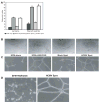Mechanisms of cytomegalovirus-accelerated vascular disease: induction of paracrine factors that promote angiogenesis and wound healing
- PMID: 18637518
- PMCID: PMC2699259
- DOI: 10.1007/978-3-540-77349-8_22
Mechanisms of cytomegalovirus-accelerated vascular disease: induction of paracrine factors that promote angiogenesis and wound healing
Abstract
Human cytomegalovirus (HCMV) is associated with the acceleration of a number of vascular diseases such as atherosclerosis, restenosis, and transplant vascular sclerosis (TVS). All of these diseases are the result of either mechanical or immune-mediated injury followed by inflammation and subsequent smooth muscle cell (SMC) migration from the vessel media to the intima and proliferation that culminates in vessel narrowing. A number of epidemiological and animal studies have demonstrated that CMV significantly accelerates TVS and chronic rejection (CR) in solid organ allografts. In addition, treatment of human recipients and animals alike with the antiviral drug ganciclovir results in prolonged survival of the allograft, indicating that CMV replication is a requirement for acceleration of disease. However, although virus persists in the allograft throughout the course of disease, the number of directly infected cells does not account for the global effects that the virus has on the acceleration of TVS and CR. Recent investigations of up- and downregulated cellular genes in infected allografts in comparison to native heart has demonstrated that rat CMV (RCMV) upregulates genes involved in wound healing (WH) and angiogenesis (AG). Consistent with this result, we have found that supernatants from HCMV-infected cells (HCMV secretome) induce WH and AG using in vitro models. Taken together, these findings suggest that one mechanism for HCMV acceleration of TVS is mediated through induction of secreted cytokines and growth factors from virus-infected cells that promote WH and AG in the allograft, resulting in the acceleration of TVS. We review here the ability of CMV infection to alter the local environment by producing cellular factors that act in a paracrine fashion to enhance WH and AG processes associated with the development of vascular disease, which accelerates chronic allograft rejection.
Figures


References
-
- Almeida GD, Porada CD, St Jeor S, Ascensao JL. Human cytomegalovirus alters interleukin-6 production by endothelial cells. Blood. 1994;83:370–376. - PubMed
-
- Almeida-Porada G, Porada CD, Shanley JD, Ascensao JL. Altered production of GM-CSF and IL-8 in cytomegalovirus-infected, IL-1- primed umbilical cord endothelial cells. Exp Hematol. 1997;25:1278–1285. - PubMed
-
- Auerbach R, Lewis R, Shinners B, Kubai L, Akhtar N. Angiogenesis assays: a critical overview. Clin Chem. 2003;49:32–40. - PubMed
-
- Billingham ME. Histopathology of Graft Coronary Disease. J Heart Lung Transplant. 1992;11:S38–S44. - PubMed
-
- Bouis D, Kusumanto Y, Meijer C, Mulder NH, Hospers GA. A review on pro- and anti-angiogenic factors as targets of clinical intervention. Pharmacol Res. 2006;53:89–103. - PubMed
Publication types
MeSH terms
Substances
Grants and funding
- HL71695/HL/NHLBI NIH HHS/United States
- R01 HL083194/HL/NHLBI NIH HHS/United States
- R01 HL071695/HL/NHLBI NIH HHS/United States
- AI21640/AI/NIAID NIH HHS/United States
- R01 HL066238/HL/NHLBI NIH HHS/United States
- R37 AI021640/AI/NIAID NIH HHS/United States
- R01 AI021640/AI/NIAID NIH HHS/United States
- R01 HL085451/HL/NHLBI NIH HHS/United States
- HL083194/HL/NHLBI NIH HHS/United States
- R01 HL088603/HL/NHLBI NIH HHS/United States
- HL65754/HL/NHLBI NIH HHS/United States
- HL 66238-01/HL/NHLBI NIH HHS/United States
- R01 HL065754/HL/NHLBI NIH HHS/United States
LinkOut - more resources
Full Text Sources
Other Literature Sources
Medical

